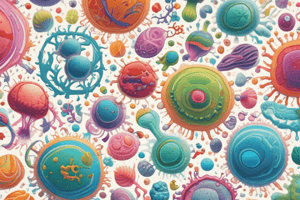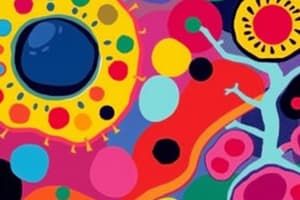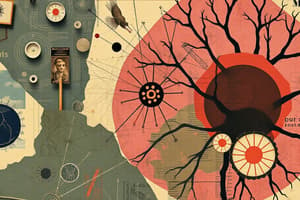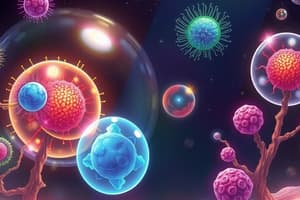Podcast
Questions and Answers
Which of the following is NOT a reason why multicellular organisms are typically made up of many small cells rather than a few large ones?
Which of the following is NOT a reason why multicellular organisms are typically made up of many small cells rather than a few large ones?
- Smaller cells allow for more efficient energy production. (correct)
- Smaller cells are easier to control and regulate.
- Smaller cells allow for faster movement of molecules between the center of the cell and its surroundings.
- Smaller cells provide a greater surface area to volume ratio.
The cell theory states that all living organisms are composed of cells.
The cell theory states that all living organisms are composed of cells.
True (A)
What is the main benefit of having many small cells rather than a few large cells in multicellular organisms?
What is the main benefit of having many small cells rather than a few large cells in multicellular organisms?
Faster movement of molecules between the center of the cell and its surroundings
The scientist who observed that all plant tissues are made of cells was ______.
The scientist who observed that all plant tissues are made of cells was ______.
Match the scientist with their contribution to the cell theory:
Match the scientist with their contribution to the cell theory:
Who coined the term 'cell' after observing cork?
Who coined the term 'cell' after observing cork?
Antonie van Leeuwenhoek was the first person to observe living cells.
Antonie van Leeuwenhoek was the first person to observe living cells.
In what year was the nucleus described by Robert Brown?
In what year was the nucleus described by Robert Brown?
The diameter of most eukaryotic cells ranges from ___ to ___ micrometers.
The diameter of most eukaryotic cells ranges from ___ to ___ micrometers.
Match the following discoveries with their year:
Match the following discoveries with their year:
Flashcards
Cell Theory
Cell Theory
The principle that all living things are made of cells.
Multicellular Organisms
Multicellular Organisms
Organisms made up of many cells, rather than one large cell.
Cell Differentiation
Cell Differentiation
The process by which cells become specialized in structure and function.
Matthias Schleiden
Matthias Schleiden
Signup and view all the flashcards
Rudolf Virchow
Rudolf Virchow
Signup and view all the flashcards
Basic Unit of Life
Basic Unit of Life
Signup and view all the flashcards
Microscope Invention
Microscope Invention
Signup and view all the flashcards
Robert Hooke
Robert Hooke
Signup and view all the flashcards
Eukaryotic vs Prokaryotic
Eukaryotic vs Prokaryotic
Signup and view all the flashcards




